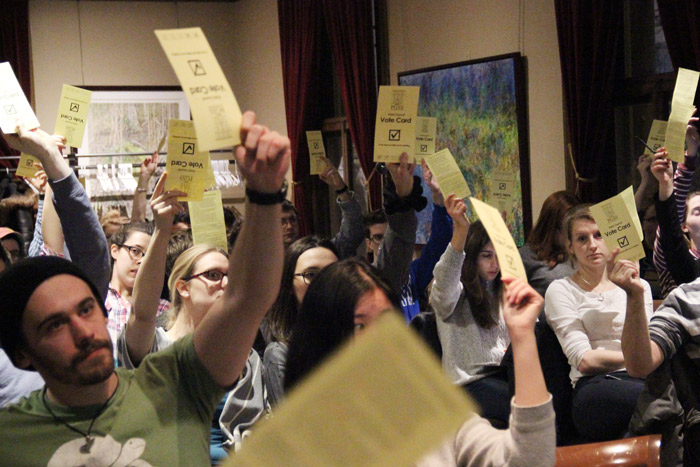On Feb. 15, the Post-Graduate Students’ Society (PGSS) Legislative Council vetoed a motion from McGill Athletics and Recreation proposing an ancillary fee increase. Council members also discussed potential changes to the status of postdoctoral students at McGill, their legal battle with the Canadian Federation of Students (CFS), and a new grant program for postgraduate students.
Athletics Ancillary Fee Increase Referendum Advisory
The Legislative Council struck down a motion to increase the McGill Athletics student ancillary fee. According to McGill Athletics and Recreation Executive Director Marc Gélinas, the proposed three per cent raise to the postgraduate fee is due largely to an increase in staff salaries and the cost of building upkeep. The new fee would be $3.63 per term for postgraduate students.
“The new AMUSE agreement was [the reason for] a significant portion of that increase in salaries,” Gélinas said. “We probably employ about [500] or 600 students [who are members of AMUSE].”
Despite McGill Athletics and Recreation presenting statistics regarding postgraduate student gym usage and a budget adjusted for the fee increase, Council members wanted to see alternative methods of boosting revenue, such as increasing ticket sales, sponsorships, and efforts to rent out gym facilities more often. The Associate Director of McGill Athletics Philip Quintal explained their intentions to diversify revenue.
“We want to increase our revenues outside of those generated from student fees, with minimal impact to student programs,” Quintal said.
The McGill Athletics and Recreation fee increase will be voted on at the General Meeting on March 15.
Canadian Federation of Students (CFS) settlement
The CFS is a student union that represents universities across Canada. The ongoing struggle over the validity of PGSS’ 2010 referendum regarding their continued membership as part of the CFS has concluded, with PGSS reaching an undisclosed settlement with the CFS. In 2009, PGSS decided to hold a referendum to split from CFS. After CFS refused to acknowledge the validity of the 2010 referendum results, the two organizations became entrenched in a lengthy legal battle.
“We have had to deal with PGSS bleeding money on this CFS case,” Secretary General Victor Frankel said. “Now that we can finally stop the bleeding, we can finally get some blood flowing to the other systems.”
Pleased with the results of the settlement, Frankel assured the Legislative Council that PGSS’ legal and financial situation has improved since last year.
Change in status of postdoctoral students
After McGill’s decision to reclassify 400 postdoctoral candidates as university employees instead of postgraduate students, PGSS has been concerned with the potential loss of all postdoctoral PGSS members.
“What we're trying to do is plan for the worst and hope for the best,” Frankel said. “We think [McGill] is going to try to [make] them all employees, rather than students.”
Due to this change, PGSS will have to account for fewer students in next year’s budget and postdoctoral events.
Graduate innovation fund
With a mandate to promote and expand McGill’s innovation agenda and create entrepreneurship opportunities for McGill students, Associate Vice-Principal of Innovation and Partnerships Angelique Mannella is creating the new Post-Graduate Campus Organisation program for postgraduate researchers to collaborate and receive funding from the university.
“The goal of this initiative is really to catalyze a community of innovators and entrepreneurs […] at McGill,” Mannella said. “Part of that will be to provide capital, but also opportunities to learn about innovation, product development, entrepreneurship, [to] help build the community, and additionally […to] provide mentorship for [the] teams that do receive the funding.”
Aside from standard application grants, Mannella envisions a “pitch night” where groups present their ideas to a panel. According to Mannella, this event will allow McGill students to receive funding for their research more easily.
“Investment in an ecosystem has long-term benefits that will come back,” Mannella said. “What I've seen […] from innovation entrepreneurship ecosystems that are really thriving is that where people get their first lift for their ideas, [that support] actually comes back and returns in other ways [….] I think that by looking at the long-term benefits, you will see that there are returns.”
Council members did not have time to vote on a proposed fee to fund Mannella’s initiative before the meeting ended. The motion will be voted on at the next PGSS meeting on March 15.










With regards to the Athletics fee request:
“Despite McGill Athletics and Recreation presenting statistics regarding postgraduate student gym usage and a budget adjusted for the fee increase”
The statistics presented were less than useful as if was essentially just raw data (counts?) on graduate students. They were unable to provide any context (trends or proportion of usage) that could support the request for funds from ALL grad students for McGill Athletics. It would be reasonable they be supported by those who benefit/use their facilities the most and they did not successfully present any stats, imo, to support it.